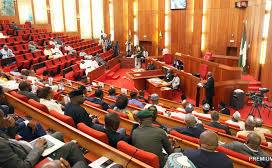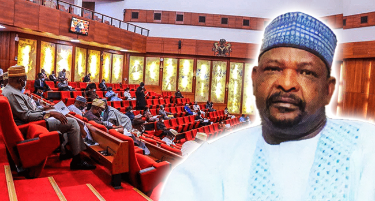The Nigerian Senate has officially pardoned and recalled Senator Abdul Ahmed Ningi, who was suspended on March 12, 2024, amidst significant controversy. The recall process was set in motion on Tuesday after Deputy Minority Leader Senator Abba Moro moved a motion expressing regret on behalf of the suspended senator. In a show of solidarity and responsibility, Moro pledged to assume full responsibility for Ningi’s actions, acknowledging the seriousness of the suspension.
During the period of his suspension, Senator Ningi’s conduct and the circumstances surrounding his suspension were subjects of intense scrutiny and debate within the legislative body. The session on Tuesday saw a mix of emotions and appeals from various senators, ultimately leading to a resolution.
The President of the Senate, Godswill Akpabio, announced Ningi’s unconditional recall after a brief but persuasive plea by some lawmakers. Akpabio highlighted Ningi’s resourcefulness and contributions to the Senate, describing him as a valuable member whose return would benefit the legislative process. He emphasized that the decision to recall Ningi transcended religious and ethnic divides, underscoring the inclusive nature of the Senate’s decision-making process.
Ningi’s recall came just two weeks before the end of his three-month suspension, which was originally set to terminate on June 12, 2024. This decision marks a significant turn in a saga that has captured the attention of political observers and the general public alike.
On March 12, 2024, the Senate suspended Senator Ningi following allegations of padding the 2024 Budget by N3.7 trillion. Representing the Peoples Democratic Party (PDP) from the Bauchi Central Senatorial District, Ningi faced a stormy session in the red chamber that culminated in his suspension for three months. The decision was made after a voice vote conducted by Senate President Akpabio, where the majority of lawmakers supported the suspension, citing the grievous nature of Ningi’s alleged offenses.
### Allegations and Controversy
The allegations against Ningi centered on his claims regarding the 2024 budget. In a contentious interview, Ningi accused the Federal Government of operating two versions of the budget. He argued that the N28.7 trillion budget passed and signed into law by President Bola Tinubu was unfairly biased against the northern region of Nigeria. According to Ningi, only N25 trillion of the budget was allocated to specific projects, while N3.7 trillion was unaccounted for, with no clear project ties.
These statements sparked an outrage among many Senators and within the Presidency, with critics describing Ningi’s claims as “far-fetched and unbecoming of a leader of his status.” The backlash was swift and intense, leading to a heated debate and ultimately his suspension. Ningi later clarified his position, denying that he had suggested the existence of two separate budgets. However, he maintained his stance that a significant portion of the budget lacked transparency in project allocation.
 With Senator Ningi’s recall, the Senate aims to move past the controversy and focus on legislative duties that benefit the nation. The decision to reinstate him highlights a commitment to reconciliation and unity within the legislative body. As the Senate President Akpabio noted, Ningi’s return is expected to enhance the Senate’s functionality and legislative productivity.
With Senator Ningi’s recall, the Senate aims to move past the controversy and focus on legislative duties that benefit the nation. The decision to reinstate him highlights a commitment to reconciliation and unity within the legislative body. As the Senate President Akpabio noted, Ningi’s return is expected to enhance the Senate’s functionality and legislative productivity.
The unfolding of this saga has shed light on the complexities and challenges within Nigeria’s legislative processes. It also emphasizes the importance of transparency, accountability, and unity in governance. As Senator Ningi resumes his duties, the Senate’s decision to recall him will likely be scrutinized for its impact on future legislative conduct and governance practices.
In conclusion, the Senate’s decision to pardon and recall Senator Abdul Ahmed Ningi serves as a notable example of the intricate balance between accountability and reconciliation in Nigeria’s political landscape. The legislative body now looks forward to moving beyond the controversy and focusing on its core responsibilities of governance and legislative oversight.




